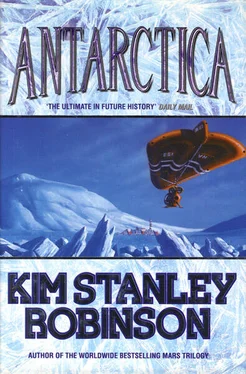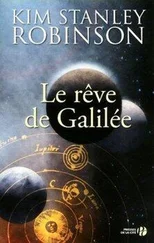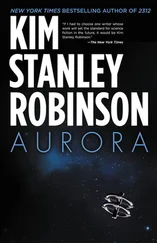Once or twice he considered gearing up and going outside to cross-country ski beside the tractor; this was officially forbidden, but he had been told it was one of the main forms of entertainment for SPOT train conductors. X was a terrible athlete, however; his last adolescent sprout had taken him to six foot ten inches tall, and in that growth he had lost all coordination. He had tried to learn cross-country skiing on the prescribed routes around McMurdo, and had made a little progress; and sometimes it was a tempting idea to break the monotony; but then he considered that if he fell and twisted an ankle, or stunned himself, the SPOT tractors would continue to grind mindlessly on, leaving him behind trying to catch up, and no doubt failing.
He decided to pass on going outside. Monotony was not such a bad thing. Besides there would be some crevasse fields to be negotiated, even up here on the plateau, where the ice was often smooth and solid for miles at a time. Although it was true that the Army Corps of Engineers had mitigated all crevasses they didn’t care to outflank, meaning they had blown them to smithereens, then bulldozed giant causeways across the resulting ice-cube fields. This process had created some dramatic passages on the Skelton Glacier, which rose from the Ross Sea to the polar plateau in less than thirty kilometers, and was therefore pretty severely crevassed in places, so much so that the Skelton had not been the preferred route for SPOT; the first trains had crossed the Ross Ice Shelf and ascended the Leverett Glacier, a gentler incline much farther to the south. But soon after SPOT had become operational, and quickly indispensable for the construction of the new Pole station, the Ross Ice Shelf had begun to break apart and float away, except for where it was anchored between Ross Island and the mainland. The Skelton route could make use of this remnant portion of the shelf, and so every year the Corps of Engineers re-established it, and off they went. X’s nighttime ascent of the Skelton, through the spectacular peaks of the Royal Society Range, had been the most exciting part of his trip by far, crunching up causeway after causeway of crushed ice concrete, with serac fields like dim shattered Manhattans passing to right and left.
But that had been many days ago, and since reaching the polar plateau there had not been much excitement of any sort. The fuel depots they passed were automated and robotic; the vehicles stopped one by one next to squat green bladders, were filled up and then moved on. If any new crevasses had opened up across the road since the last passing of a train, the lead vehicle’s pulse radar would detect it, and the navigation system would take appropriate action, either veering around the problem area or stopping and waiting for instructions. Nothing of that sort actually happened.
But he had been warned it would be this way, and was ready for it. Besides, it was not that much different from all the rest of the mindless work that Ron liked to inflict on his GFAs; and here X was free of Ron. And he wasn’t going to run into anyone he didn’t want to, either. So he was content. He slept a lot. He made big breakfasts, and lunches, and dinners. He watched movies. He read books; he was a voracious reader, and now he could sit before the screen and read book after book, or portions of them, tracking cross-references through the ether like any other obsessive young gypsy scholar. He made sure to stop reading and look out the windows at the great ice plain during the twilights bracketing noon, twilights that grew longer and brighter every day. Though he did not experience again anything quite as overwhelming as the indigo twilight of the crescent moon, he did see many beautiful predawn skies. The quality of light during these hours was impossible to get used to, vibrant and velvet beyond description, rich and transparent, a perpetual reminder that he was on the polar cap of a big planet.
Then one night he got some weather. The stars were obscured to the south, the rising moon did not rise on schedule, though clearly it had to be up there, no doubt shining on the top of the clouds and, yes, making them glow just a little, so that now he could see them rushing north and over him, like a blanket pulled over the world; no stars, now, but a dim cloudy rushing overhead; and then through the thick insulation of the cab he could for once hear the wind, whistling over and under and around his tractor. He could even feel the tractor rock just a tiny bit on its massive shock absorbers. A storm! Perhaps even a superstorm!
Then the moon appeared briefly through a gap, nearly a half moon now, full of mystery and foreboding, flying fast over the clouds, then gone again. Black shapes flicked through the clouds like bats. X blinked and rubbed his eyes, sure that he was seeing things.
A light tap tapped on the roof of his vehicle. “What the hell?” X croaked. He had almost forgotten how to talk.
Then his windshield was being covered by a sheet of what looked like black plastic. Side windows and back window also. X could see gloved fingers working at the edges of the plastic, reaching down from above to tape the sheets in place. Then he could see nothing but the inside of the cab.
“What the hell!” he shouted, and ran to the door, which resembled a meat-locker door in both appearance and function. He turned the big handle and pushed out. It didn’t move. It wouldn’t move. There were no locks on these tractor doors, but now this one wouldn’t open.
“What-the- hell ,” X said again, his heart pounding. “HEY!” he shouted at the roof of the vehicle. “Let me out!” But with the vehicle’s insulation there was no way he would be heard. Besides, even if he were …
He ran down the narrow low stairs leading from the cab into the vehicle’s freight room. On one side of the big compartment were two big loading doors that opened outward, but when he twisted the latch locks down, and turned the handles and pushed out, these doors too remained stubbornly in place. They were not as insulated as the cab doors, and when he pushed out on them hard, a long crack of windy darkness appeared between them. He put an eye to the thin gap, and felt the chill immediately: fifty degrees below zero out there, and a hard wind. There was a plastic bar crossing the gap just below eye level; no doubt it was melted or bonded to the doors, and holding them shut. “Hey!” he bellowed out the crack. “Let me out! What are you doing!”
No answer. His face was freezing. He pulled back and blinked, staring at the crack. The bar was welded or glued or otherwise bonded across the doors, locking them in place. No doubt it was the same up there on the outside of the cab door.
He recalled the emergency hatch in the roof of the cab, there in case the vehicle fell through sea ice or got corked in a crevasse, so that the occupants had to make their escape upward. X had thought it a pretty silly precaution, but now he ran back and pulled that handle around to the open position, a very stiff handle indeed, and shoved up. It wouldn’t go. Stuck. He was trapped inside, and the windshield and cab windows were covered. All in about two minutes. Ludicrous but true.
He thought over the situation while putting on the layers of his outdoor clothing: thick smartfabric pants and coat, insulated Carhartt overalls, heavy parka, gloves and mittens. He would need it all outside, if he could get outside, but now he began to overheat terribly. Sweating, he turned on the radio and clicked it to the McMurdo coms band. “Hello McMurdo, McMurdo, this is SPOT number 103, SPOT calling Mac Town do you read me over over.” While he waited for a reply he went to one of the closets of the cab, and pulled a brand new hacksaw from a tool chest.
“SPOT 103, through the miracle of radio technology you have once again manipulated invisible vibrations in the ether to reach Mac Coms, hey X, how are you out there, over.”
Читать дальше











